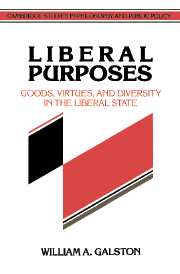Book contents
- Frontmatter
- Contents
- Acknowledgments
- PART I LIBERALISM AND POLITICAL PHILOSOPHY
- PART II LIBERALISM AND NEUTRALITY
- 4 Liberalism and the neutral state
- 5 Liberalism and neutral public discourse
- 6 Moral personality and liberal theory
- 7 Pluralism and social unity
- PART III LIBERALISM WITHOUT NEUTRALITY
- PART IV FROM THEORY TO PRACTICE IN THE LIBERAL STATE
- Notes
- Index
5 - Liberalism and neutral public discourse
Published online by Cambridge University Press: 05 June 2012
- Frontmatter
- Contents
- Acknowledgments
- PART I LIBERALISM AND POLITICAL PHILOSOPHY
- PART II LIBERALISM AND NEUTRALITY
- 4 Liberalism and the neutral state
- 5 Liberalism and neutral public discourse
- 6 Moral personality and liberal theory
- 7 Pluralism and social unity
- PART III LIBERALISM WITHOUT NEUTRALITY
- PART IV FROM THEORY TO PRACTICE IN THE LIBERAL STATE
- Notes
- Index
Summary
Chapter 4 was structured around a basic distinction between neutral and nonneutral defenses of liberalism. In this chapter I add two layers of complexity to this dyad: first, by distinguishing two variants of neutral defense, the “pragmatic” and the “political”; second, by unpacking and examining the various understandings of neutrality employed by the “political” theorists of liberalism.
Broadly speaking, three quite distinct approaches to liberalism have emerged in the past generation. At one end of the spectrum we find perfectionist liberalism – the thesis that liberalism finds its justification, and its point, in a distinctive vision of the human good. In Joseph Raz's view, for example, liberalism “regards personal freedom as an aspect of the good life. It is a view of freedom deriving from the value of personal autonomy.”
At the other end of the spectrum lies what may be called pragmatic liberalism – the thesis that liberalism can be understood as an agreement struck by symmetrically situated, self-interested individuals animated solely by prudential or strategic considerations. This is the view that John Rawls calls “modus vivendi”; it is represented most comprehensively and persuasively in our time by David Gauthier.
Between these two views lies what Charles Larmore has called political liberalism, represented most conspicuously by Rawls (and by Larmore himself). As I cannot improve on Larmore's summary, I simply quote it. Political liberalism “is a conception at once moral and minimal.
- Type
- Chapter
- Information
- Liberal PurposesGoods, Virtues, and Diversity in the Liberal State, pp. 98 - 117Publisher: Cambridge University PressPrint publication year: 1991



